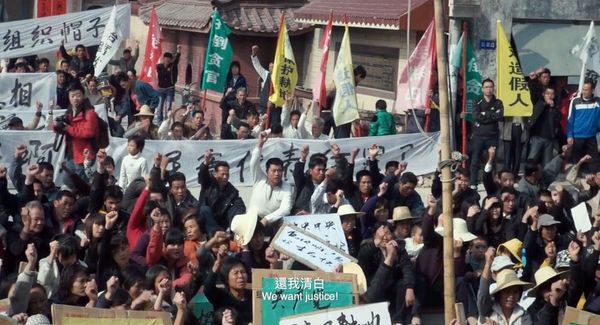Eye For Film >> Movies >> Lost Course (2019) Film Review
Lost Course
Reviewed by: Sunil Chauhan

“Just look at these corrupt officials with their cars and villas,” says one resident early on in Jill Li’s Lost Course. “They don’t have to work.” That resentment is what sparks protests in Wukan, a rural, coastal fishing village that hit international news headlines a decade ago.
Filmed across several years, Li’s film captures the village in flux, beginning with footage of civil disturbances that immediately drop us into a hotbed of feverish, righteous anger, with civilians even creating a makeshift garrison to stop outsiders entering in response to local party officials seizing and selling off land that they would prefer to farm. As pressure escalates and the villagers’ demand to have a say in local affairs is conceded in the form of an election, Li’s film charts the bittersweet progress of locals who ascend from street-level activism to village politics. In one man’s living room, we see a framed inscription bearing the words: “Forever uphold and promote democracy. Defy hardship with steadfast will.” State obstruction of would-be reformers rapidly becomes evident however and early idealism soon sours.
If it doesn’t quite maintain the pace of early scenes, Lost Course’s tightly edited three hours are gripping, told through a revolving cast of memorable characters, from senior party representative Lin who straddles party loyalty with his support for collective local action, to young, hip aspirational photo journalist Xing and the smiley Hong, whose path might be the most unexpected. Women on the street – contributing candid asides like “they speak democracy, they just want power” - meanwhile bitterly suggest the new instalments are no improvement. After all, the land – that initial cause for the unrest - is still in the hands of outsiders. While the issue of those all-important landgrabs comes and goes, what Li presents instead is something like a microcosm of Chinese politics, seen at ground-level. One elderly man opines that if every village in China did what Wukan has done, it would lead to “chaos”. He might not support government clamp downs, but he understands why they happen.
Though party superiors are never filmed (likely they had no interest in taking part), the resistance from higher-ups is ever-present. Equally, while Li’s sympathies are clear, care is taken to ensure Lost Course is never dogmatic or fixed on a particular target in its crosshairs. That might steer it a little too neutral for some, but Lost Course maintains an observational purity, expertly tracking developments as they happen through a tapestry of views. It’s also light on its feet and completely immersive. Such is the level of closeness, the apparent lack of distance between Li and her subjects, that for three hours, you feel like you’re right there with them. It’s a film for the moment too - tackling local political action, distrust of central government, and human rights. These are political faultlines in China as anyone following developments in Hong Kong can attest to, but carry an undeniable broader resonance.
Reviewed on: 21 Sep 2021















